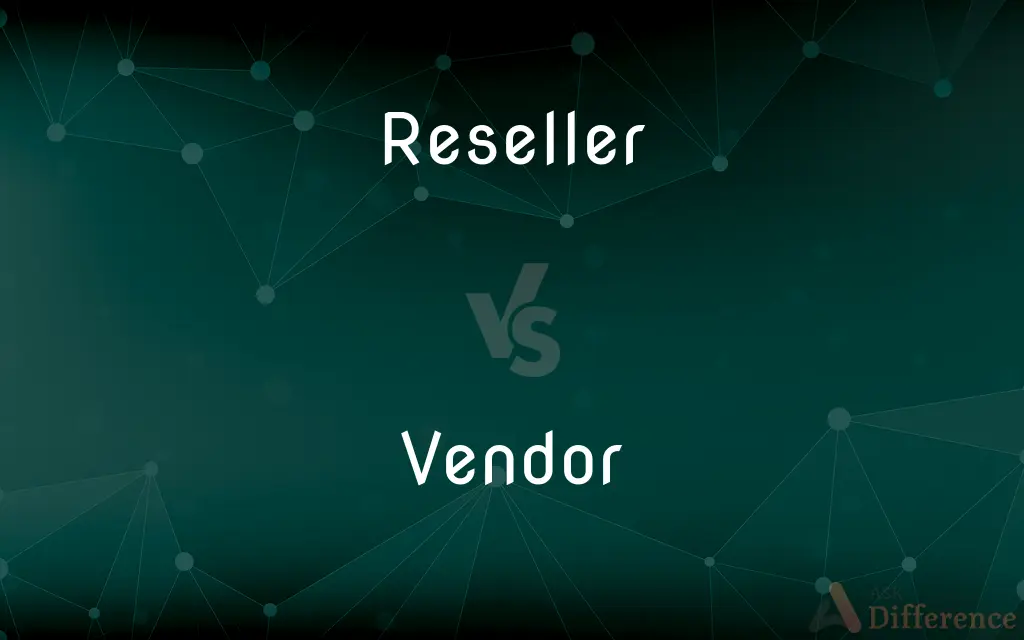Reseller vs. Vendor — What's the Difference?
Edited by Tayyaba Rehman — By Maham Liaqat — Updated on April 18, 2024
A reseller purchases and resells products without alteration, focusing on distribution, whereas a vendor supplies goods or services, often involving production or direct sourcing.

Difference Between Reseller and Vendor
Table of Contents
ADVERTISEMENT
Key Differences
A reseller operates by buying products from manufacturers or vendors and selling them to end-users or other businesses, typically without changing the product. On the other hand, a vendor is directly involved in the supply chain, either by manufacturing products or providing services directly to consumers or other businesses.
Resellers often focus on specific market segments and add value through marketing, customer service, and support. Whereas, vendors can be more involved in the development and innovation of their products or services, playing a critical role in product specifications and quality.
The relationship between resellers and their suppliers can be seen as a partnership where vendors supply the goods and resellers distribute them to wider markets. Conversely, vendors may sell directly to the end consumers, bypassing the reseller entirely, depending on their business model.
In terms of business operations, resellers might not need extensive infrastructure for production but may require significant effort in logistics and customer outreach. In contrast, vendors often invest heavily in production capabilities, research and development, and direct sales strategies.
Resellers typically work on margins, buying at wholesale prices and selling at marked-up prices to cover their operational costs and profit. Vendors, however, control the pricing of their goods or services more directly, influencing market pricing and distribution strategies.
ADVERTISEMENT
Comparison Chart
Definition
Buys and sells products without modification.
Supplies products or services, often producing them.
Primary Focus
Distribution and sales.
Production and direct supply.
Business Model
Purchases from suppliers and sells to consumers or businesses.
May sell directly to consumers or through distributors.
Value Addition
Marketing, customer service, and support.
Product development, innovation, and quality control.
Pricing Strategy
Buys wholesale, sells at retail or markup prices.
Sets prices based on production costs and market conditions.
Compare with Definitions
Reseller
Profits from the markup on products sold.
The reseller made a significant profit by marking up imported goods.
Vendor
A company that manufactures or supplies products directly.
The vendor showcased its new products at the trade show.
Reseller
A business that purchases goods from suppliers and sells them to consumers or other businesses.
The online store operated as a reseller of various technology brands.
Vendor
Provides services or goods to consumers or other businesses.
The software vendor offered customized solutions for businesses.
Reseller
Acts as an intermediary without altering the product.
As a software reseller, the company provided additional customer support.
Vendor
Controls product pricing and distribution channels.
As the main vendor, the company set competitive prices to dominate the market.
Reseller
Focuses on distribution efficiency and market reach.
The reseller expanded its market by offering competitive pricing.
Vendor
Often involved in direct sales strategies.
The vendor decided to sell its products directly online, bypassing traditional stores.
Reseller
Often operates under a reseller permit or license.
The company held a reseller permit to buy goods tax-free for resale.
Vendor
Engages in product innovation and quality control.
The vendor invested heavily in R&D to improve product quality.
Reseller
A reseller is a company or individual (merchant) that purchases goods or services with the intention of selling them rather than consuming or using them. This is usually done for profit (but could be resold at a loss).
Vendor
In a supply chain, a vendor, or a seller, is an enterprise that contributes goods or services. Generally, a supply chain vendor manufactures inventory/stock items and sells them to the next link in the chain.
Reseller
To sell again.
Vendor
A person or company offering something for sale, especially a trader in the street
An Italian ice-cream vendor
Reseller
To sell (a product or service) to the public or to an end user, especially as an authorized dealer.
Vendor
One that sells or vends something
A street vendor.
A vendor of software products on the Web.
Reseller
A company or individual that purchases goods or services with the intention of reselling them rather than consuming or using them.
Vendor
One that provides products or services to a business for a fee.
Vendor
A vending machine.
Vendor
A person or a company that vends or sells.
Vendor
A vending machine.
Vendor
To bundle third-party dependencies with the source code for one's own program.
I distributed my application with a vendored copy of Perl so that it wouldn't use the system copies of Perl where it is installed.
Vendor
As the software vendor, to bundle one's own, possibly modified version of dependencies with a standard program.
Strawberry Perl contains vendored copies of some CPAN modules, designed to allow them to run on Windows.
Vendor
A vender; a seller; the correlative of vendee.
Vendor
Someone who promotes or exchanges goods or services for money
Common Curiosities
How does a reseller add value if they do not alter the product?
Resellers add value through marketing, customer support, and efficient distribution networks.
What are the benefits of buying from a vendor instead of a reseller?
Buying from a vendor can offer benefits like direct customer support, potential cost savings, and access to the latest products directly from the source.
Do resellers usually have exclusive rights to sell products?
Resellers may or may not have exclusive rights to sell products; this depends on their specific agreements with suppliers or vendors.
Can a company be both a reseller and a vendor?
Yes, some companies operate both as resellers and vendors depending on their product lines and business strategies.
What is the main difference between a reseller and a vendor?
The main difference is that a reseller buys and sells products as they are, while a vendor may be involved in manufacturing or providing services.
What risks do resellers face in their business model?
Resellers face risks such as inventory obsolescence, dependency on supplier relationships, and competition in pricing.
How do vendors control the pricing of their products?
Vendors control pricing based on production costs, market demand, and competitive landscape, potentially adjusting prices to optimize sales and profits.
How important is location for a reseller's business?
Location can be crucial for resellers, especially in retail, as it affects foot traffic, delivery logistics, and market access.
What kind of support do vendors typically offer to resellers?
Vendors may offer support to resellers in the form of marketing materials, training, favorable pricing, and sometimes exclusive selling rights.
How can a reseller differentiate itself in a competitive market?
A reseller can differentiate itself by offering superior customer service, specialized knowledge, additional services, or niche market focus.
Can vendors sell their products internationally?
Yes, vendors can sell their products internationally, expanding their market reach but also facing additional regulatory and logistical challenges.
How do vendors benefit from working with resellers?
Vendors benefit from working with resellers by extending their market reach, reducing the burden of marketing and distribution, and tapping into the reseller’s local market expertise.
What strategies can vendors use to manage their relationships with resellers?
Vendors can manage relationships with resellers through regular communication, performance incentives, clear contractual agreements, and providing sales and technical training.
What types of products are typically handled by resellers?
Resellers typically handle products that do not require after-sales services or complex installations, such as electronics, clothing, and general merchandise.
Are there ethical considerations for vendors when selecting resellers?
Yes, vendors need to consider ethical issues like the reseller's business practices, commitment to customer service, and alignment with the vendor's brand values.
Share Your Discovery

Previous Comparison
Mission vs. Church
Next Comparison
Identical vs. SimilarAuthor Spotlight
Written by
Maham LiaqatEdited by
Tayyaba RehmanTayyaba Rehman is a distinguished writer, currently serving as a primary contributor to askdifference.com. As a researcher in semantics and etymology, Tayyaba's passion for the complexity of languages and their distinctions has found a perfect home on the platform. Tayyaba delves into the intricacies of language, distinguishing between commonly confused words and phrases, thereby providing clarity for readers worldwide.














































